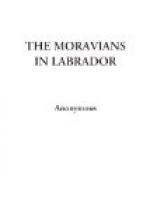When the missionary told them that the Greenlanders had been washed from their sins in the blood of Jesus, they were amazed, and said, “they must have been very wicked fellows!” and when he spoke to them of eternal damnation, they supposed it was only the Kablunat that were sent to hell, (because they did wicked things,—as for them they were good Karalit.) Having upon one occasion mentioned God to them, they said, “Thou speakest of Torngarsuk.” He then asked them if Torngarsuk created all things; they answered, “We do not know.” But an Angekok said immediately, “Torngarsuk ajungilak,”—the great spirit is good and holy; and another added, “Ajuatangilat,”—nothing is impossible to him; and a third subjoined, “Saimavot,”—he is gracious and merciful. They, however, could form no idea of what he said to them of a Saviour and Redeemer; he was obliged to explain that word to them by parables, when they would ask if this mighty Personage would be their good friend, for they could conceive of him in no other way than as a great lord who was to come and deliver them from the Kablunat, and assist them against the northern Kraler. With the fickleness so natural to savages, they would listen attentively to the first instructions, but when it was often repeated, they would say, as both ancient and modern Athenians, “we know all that already, tell us something new,” or like the Greenlanders, sometimes profess to believe it, and the next moment declare they neither understood nor cared about it. With those who had patience, and were so disposed, the missionary went over every doctrine about which they spoke in a catechetical way, and endeavoured by short questions, to see if they comprehended it, and tried to allure them to make further inquiry.
During their whole intercourse, the Esquimaux showed themselves very friendly, and were particularly glad when they saw Jans Haven again; some of them recollected many things he had told them the year before, and praised him for keeping his promise of returning, and others boasted of the good they had heard of him from their countrymen. The brethren could go any where among them with the utmost security; but they were under the necessity of submitting to their curiosity, and allowing them to handle every thing they saw, even when they perceived this liberty to be attended with danger; yet even now, such was the influence of their friendly behaviour, that very little damage was incurred. In one tent, they searched Drachart’s box, and carried every thing off, taking also his hat along with them. Without uttering any reproachful complaint, the missionary went to some of the older people, and said, “Now I have got no hat to skreen me from the sun.” They instantly called to the young men, and desired them to give him back every thing, which they did with the utmost coolness, and only requested a knife as a keepsake.
At another time, when they had secretly emptied his box, no sooner did the chief elders of the tribe perceive the circumstance, than they called every person belonging to the tent to come before them, and desired that what had been taken away should be restored; the thief immediately came forward, and without betraying any consciousness of having done wrong, threw down what he had taken, saying, “Thou needest it thyself!”




